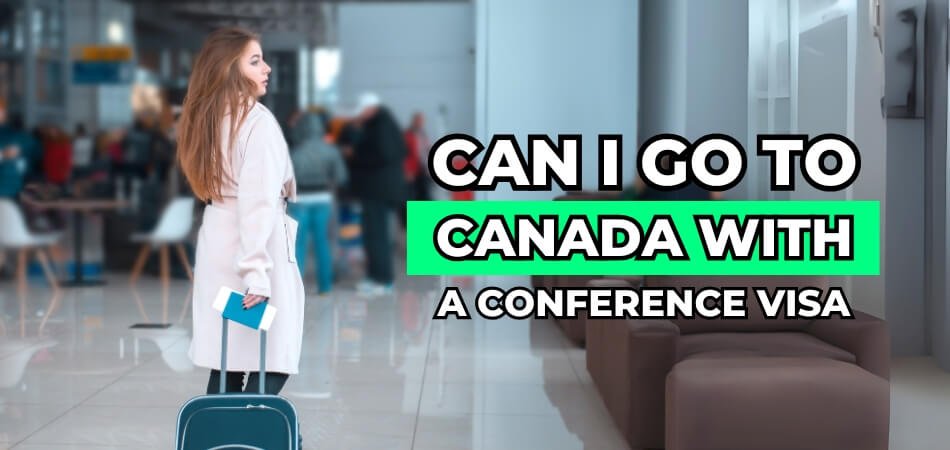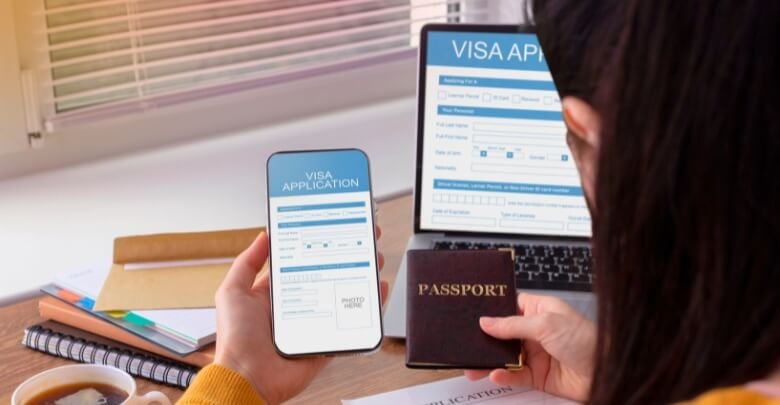Planning to attend a conference in Canada? Whether you’re a professional looking to network or a researcher eager to present your work, traveling to Canada for a conference can be an exciting opportunity. But a common question arises: Can I go to Canada with a conference visa?
The answer is yes! You can apply for a Temporary Resident Visa (TRV), commonly known as a conference visa, to attend your event. To secure this visa, you’ll need an invitation letter from the conference organizers, along with your passport, proof of financial means, and biometric details.
The application process is simple and can be completed online. Keep reading as we dive deeper into the steps you need to take and the documents required, ensuring your journey to Canada is as smooth as possible.
What Can You Do with a Conference Visa?
Conferencing visas may seem simple, but they offer more flexibility than you might expect. Beyond just attending the specific conference, a Temporary Resident Visa (TRV) opens up several opportunities. Here’s a breakdown of what you can accomplish with a conference visa in Canada.

Attend Conferences and Seminars
With this visa, you can participate in any conference or seminar that relates to your field. It allows you to network with professionals and industry experts, which can be crucial for your career advancement. You’re also able to exchange ideas and gain new insights, enriching your professional experience significantly.
Tourist Activities
While your primary reason for visiting is the conference, your visa does not restrict you to just that. You have the freedom to explore Canada’s tourist attractions during your stay. This could mean visiting landmarks, enjoying local cuisine, or simply taking in the diverse cultures across the country.
Short Educational Courses
If a relevant short-term course coincides with your visit, your visa permits you to enroll. These courses can be in conjunction with the conference or a separate educational opportunity. This is a perfect chance to improve your skills and bring new knowledge back to your home country.
Networking Opportunities
A conference visa also allows you to build and extend your professional network beyond just attending events. Engaging with other attendees in formal and informal settings enhances your connections and can open doors to future collaborations. These relationships are invaluable and can impact your professional life long after you return home.
Your conference visa is more than just a ticket to an event; it’s a gateway to a wealth of enriching experiences. From learning new skills to discovering the many advantages of a conference visa in Canada, the opportunities are endless. Whether you’re networking with professionals or immersing yourself in Canada’s rich culture, this visa opens countless doors.
Can I Go to Canada With a Conference Visa?
Yes, you absolutely can go to Canada with a conference visa! This visa, categorized as a Temporary Resident Visa (TRV), allows individuals to attend conferences, seminars, and similar events in Canada. However, specific requirements and steps must be met to ensure a smooth process. Let’s break it down so you can prepare confidently.

Obtaining an Invitation Letter
To start, request an official invitation letter from the conference organizers detailing your participation and event specifics. This letter serves as proof that you are attending the conference and establishes the purpose of your visit. Without it, your visa application could be delayed or denied, so prioritize getting this document early.
The letter not only strengthens your case but also reassures the visa authorities of your intent to return home after the event. Ensure it includes your name, the event dates, and the organizers’ contact information. It adds legitimacy to your trip and shows your plans are well-organized.
Applying for a Temporary Resident Visa (TRV)
Once you have your invitation letter, apply for your TRV through the IRCC website. The process is simple, but preparation is key to avoid complications. Include all required documents like your passport, financial proof, travel details, and the invitation letter.
Be ready to submit biometrics—fingerprints and a photograph—if requested, as it’s a standard part of the process. Additionally, paying the visa application fee on time ensures your submission is processed without delays. Double-check your documents for accuracy to avoid setbacks.
Visa Processing and Approval
Visa processing times can vary depending on where you apply from, so start early to stay ahead. Check the IRCC website for estimated timelines and track your application’s progress. This helps you prepare for any unexpected delays.
Once approved, you will receive your TRV, allowing you temporary entry to Canada for the conference. Keep a close eye on communication from visa officials to respond promptly if additional information is needed.
Planning Your Travel
Booking flights and accommodations in advance not only saves money but also ensures you’re ready when your visa is approved. Early planning allows you to focus on the conference without worrying about last-minute arrangements.
Consider purchasing travel insurance to protect yourself from unforeseen events like medical emergencies or trip cancellations. Travel insurance provides peace of mind during your time in Canada, letting you focus on the conference experience.
Entering Canada and Meeting Requirements
Upon arrival, border officials will verify your documents, so have your TRV, passport, and invitation letter ready for inspection. Officials may ask questions about your visit, so confidently explain your purpose and event details.
Carry any supporting documents like proof of funds or accommodation bookings to ensure a smooth entry process. Demonstrating clear and prepared plans helps build trust with border officers and speeds up your entry.
How to Prepare the Required Documents to Apply for Conference Visas?
Applying for a conference visa can feel overwhelming, but having the right documents ready simplifies the process. Organizing your paperwork step by step ensures you meet all requirements and avoid delays. Below is a clear guide to help you prepare everything you need for a smooth visa application.
Step 1: Request the Official Invitation Letter
One of the first things to secure is an invitation letter from the conference organizers. This document should clearly mention your name, role, and event details, confirming your participation. Show the purpose of your visit and justify your need to attend the conference. A strong invitation letter also supports your application as part of the visa category for conferences in Canada, validating your travel intent.
Step 2: Ensure Your Passport is Valid
Your passport is the cornerstone of your visa application, and its validity must align with Canadian requirements. Double-check that your passport is valid for at least six months beyond your intended return date. Ensure there are enough blank pages for visa stamps and any additional requirements upon arrival. If your passport expires soon, consider renewing it before applying to avoid complications.
Step 3: Prepare Financial Proof
Visa officers need assurance that you can financially support yourself during your stay in Canada. Bank statements from the past few months, salary slips, or sponsorship letters serve as valid proof. These documents demonstrate that you can cover expenses like accommodation, meals, and travel. Be transparent about your finances, as incomplete or unclear records may cause delays.
Step 4: Complete Your Travel Itinerary
A detailed travel itinerary shows you have a well-organized plan for your visit. Include flight bookings, accommodation reservations, and any pre-arranged conference schedules. This document reassures authorities of your clear plans and intention to return home after the event. While it doesn’t have to be finalized, an itinerary helps outline your expected activities in Canada.
Step 5: Prepare Additional Supporting Documents
Other supporting documents may strengthen your application, depending on your circumstances. These include proof of employment, a no-objection certificate from your employer, or evidence of business ties. If self-employed, provide details of your business registration or tax filings to prove your stability. Such additional papers demonstrate your strong ties to your home country and commitment to returning.
What is the Process for Applying for a Conference Visa in Canada?
Applying for a conference visa in Canada involves a series of clear steps that ensure a smooth and successful application process. By being aware of and following each stage, you can simplify the experience and avoid common pitfalls. Here is a step-by-step guide to help you get prepared.

Secure Your Invitation Letter
Before starting your application, request an official invitation letter from the conference organizers. This document must outline your participation, event details, and organizer contact information. The letter serves as proof of your visit’s purpose and is vital for the visa process. Without it, your application cannot move forward successfully.
Prepare Required Documents
Gather all necessary documents, including a valid passport, proof of funds, and travel plans. You’ll also need the invitation letter and biometric details if required. Ensuring every document is accurate and up to date helps avoid unnecessary delays. Incomplete submissions can lead to rejections or requests for additional information.
Submit Your Visa Application Online
Complete your visa application through the official IRCC (Immigration, Refugees, and Citizenship Canada) website. Upload all supporting documents and double-check for accuracy before submitting. Pay the visa application fee as prompted to finalize the submission process. Keep a copy of your application confirmation for future reference.
Provide Biometrics if Required
Depending on your country, you may need to provide biometric details, including fingerprints and a photograph. Schedule an appointment at an authorized center and complete this step promptly. Biometrics ensure identity verification and are a routine part of the process for many applicants. Missing this requirement may delay your visa decision.
Wait for Processing and Approval
Visa processing times vary based on the applicant’s country and workload at the visa office. Regularly check your application status through the IRCC website for updates. Once approved, you’ll receive your Temporary Resident Visa (TRV) to attend the conference. Plan your travel once the visa is confirmed to avoid last-minute issues.
Tips to Help You Make the Most of Your Conference Visa
Attending a conference in Canada is an exciting opportunity to learn, network, and explore a new destination. Making the most of your visa requires planning and a clear strategy. Here are practical tips to ensure your trip is productive and enjoyable:
- Plan Your Schedule Ahead of Time: Review the conference agenda early and highlight sessions you don’t want to miss. Prioritize workshops, panels, or networking events relevant to you.
- Network with Other Attendees: Take advantage of networking opportunities during breaks or social events. Building professional relationships can lead to collaborations or future opportunities.
- Explore Canada’s Attractions: Your conference visa allows you to experience Canada’s culture and attractions. Schedule time to visit nearby landmarks or local tourist spots.
- Carry Essential Travel Documents: Always keep your passport, visa, and invitation letter with you during travel. Having these handy helps avoid unnecessary stress at border checks.
- Budget Wisely for Your Trip: Plan your expenses for food, accommodation, and transportation. Sticking to a budget ensures you enjoy your stay without overspending.
- Attend Relevant Workshops or Courses: If short educational programs are available, consider joining them. These opportunities enhance your skills and complement the conference experience.
- Stay Organized and Manage Time: Keep track of your schedule, flights, and accommodations. Staying organized helps you focus on learning and making meaningful connections.
FAQs about Can I Go to Canada With a Conference Visa?
If you’re planning to attend a conference in Canada, you may have a few questions about the process and requirements. To help you navigate this journey, here are five frequently asked questions with detailed answers.
Can I Extend My Conference Visa if Needed?
Yes, you can apply for an extension if your conference visa is about to expire, but your stay must remain temporary. Submit an application through IRCC, including a valid reason, supporting documents, and proof of sufficient financial resources.
Can I Attend Multiple Conferences on One Visa?
Yes, you can attend multiple conferences during your stay, as long as your visa remains valid. Ensure all conferences align with your approved visit’s purpose, and carry invitation letters or supporting details for each event when entering Canada.
Can I Bring My Family with Me on A Conference Visa?
Yes, family members can accompany you, but they must apply for their Temporary Resident Visas (TRVs). Each applicant will need to submit documents, including proof of funds, travel details, and a clear purpose for visiting Canada.
Is a Separate Work Permit Needed to Speak at A Conference?
No, a work permit isn’t required if you’re speaking at a conference as a guest speaker. However, you must demonstrate that the speaking role is unpaid and directly related to your professional expertise, keeping within visa rules.
What Should I Do if My Visa Application Is Denied?
If your visa is denied, review the reasons provided in the refusal letter carefully. Address the issues by submitting a stronger application with accurate documents, and you can reapply. Consulting an expert can also help improve approval chances.
Final Thoughts
As you prepare for your conference in Canada, remember that the key to a successful trip lies in meticulous preparation and knowing the requirements of your Temporary Resident Visa.
From securing your invitation letter to planning your itinerary and attending the conference, each step is vital. When you find yourself wondering, “Can I go to Canada with a conference visa?” rest assured that the answer is a resounding yes, provided you follow the guidelines outlined.
By taking advantage of the networking opportunities and educational sessions, you ensure that your trip is not only about professional growth but also about personal exploration and experiencing Canada’s vibrant culture. Make the most of your conference visa by immersing yourself in all the opportunities presented during your stay.
